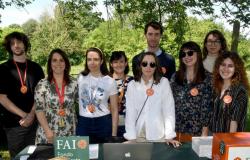«In the Court’s opinion we are faced with a case of contradictory evidence, since there is a series of circumstantial elements against Spina which, evaluated as a whole, would certainly have been suitable to indicate him as the perpetrator of the murder for which we proceed (since we cannot at all share the devaluation of the same made by the first judge), but at the same time, its value is given by the data relating to the time of death of the victim, as it emerges, with a good degree of probability, from the complex of assessments by the various experts who have dealt with the matter”. So he writes Court of Assizes of Appeal (president Claudio Mazza) in the 66 pages of the motivation of the sentence with which a month ago he also acquitted in second degree Salvatore Spina: 43 years old: all-round “caregiver” of Mrs. Diva Borin, he was accused of her murder. Acquitted, for not having committed the crime, but this time with “doubtful” formula.
Precisely such evidentiary “emergencies”, continue the judges, “prevent the Court from carrying out that “strengthened reasoning” which, on the basis of the jurisprudence of legitimacy, would be necessary to overturn the first degree acquittal ruling”.
It was the accused (with another lady) who found the old woman, 86 years old, lifeless, in his apartment in Urago Mella, around midday on March 2, 2019. And to call for help. He said that he had gone there to check on Diva’s condition, since someone had told him that they had noticed her shutters strangely closed, and that they had found her lifeless in the armchair. But first for the prosecutor Antonio Bassolino, who had challenged the abbreviated verdict, then for the deputy PC Cristina Bertotti — who had a 14-year sentence — he would have been the one to strangle her with a scarf (on which male DNA, which remained unknown, was isolated), and obstructed her airways with one hand. “It wasn’t me who hurt her,” Spina has always maintained. The motive for the prosecution is economic: to crystallize the victim’s last wishes regarding the inheritance, avoiding the risk that for the third time in recent years he would change provisions and oust him from the will. In other words, he was owed 60 thousand euros. The defense has always denied it, demonstrating that Spina did not have any significant financial problems.
In short, for the Court, the evidence against the accused and the arguments put on record by the Prosecutor’s Office and the judicial police in support of the accusatory theory hold up, contrary to what was supported by the preliminary hearing judge. But it’s not enough. «A first unacceptable assessment is that made by the preliminary hearing judge regarding the significance of the economic motive that characterizes the position of Spina, who is one of the two subjects who would have benefited from Borin’s inheritance following his death (and indeed, the one who would have benefited the most, since of the cash sum of 100 thousand euros 60 thousand would have gone to him, in addition to 50% of the victim’s house)”. For the judges, the extraneousness of the other heir – the nephew – to the death of the relative was evident, demonstrated by in-depth investigations. For the rest, continues the Court, «it is especially important to underline that in the first judge’s assessment, there appears to have been a lack, from a logical point of view, of the necessary “connection” between that motive (whose “plausibility” is also recognized in the sentence) and the specific circumstances relating to the murder, which peacefully lead to excluding with certainty a predatory motive”. In essence, the judges of second instance reiterate on the point, “it is not possible to identify, on the basis of the available procedural emergencies, any other person who could benefit from the death of the poor Diva Borin”: it is difficult to hypothesize a murder arising from hatred or revenge, therefore at the hands, for example, of a condominium owner: all of them, moreover, were the subject of investigations. And they wouldn’t have been in the area. Furthermore, the Court does not overlook the “financial situation” of the accused and his wife, who allegedly “self-financed” themselves by withdrawing cash with credit cards, against balances of a few tens of euros on their accounts and some debts despite of little importance not paid: it would not appear, in short, that they had put aside savings worthy of note. «But what seems to have been underestimated the most is Spina’s personality, as the procedural emergencies do not appear to be in line with the description of a person who was content with the modest life he led: in reality, there are many elements that lead us to believe that he ardently desired a “qualitative leap” in his standard of living”.
Another piece of evidence that the Court considers to be of “considerable weight” – we read again in the reasons – is the behavior of the accused on the morning of March 2, 2019, when Mrs. Diva was found lifeless, also in relation to the contradictions in her statements. «In addition to the singularity of having requested the presence of another lady (not previously contacted by telephone, as instead claimed by Spina) where concerns for the feared health conditions of Diva Borin would have required maximum speed, what is above all notable is the gesture immediately made by Spina, as soon as he entered the victim’s house, of untying the scarf that was around the lady’s neck”. «Hardly credible», for the judges, it could have been an instinctive and irrational gesture aimed at helping her: «Her death was obvious to anyone», as also described by the accused himself. «It then becomes natural to think that it was a gesture carried out in order to prepare a plausible explanation for the possible presence of his fingerprints on the scarf during the investigations: on this point, the observation of the appellant prosecutor can also be considered entirely correct, according to which, once it was peacefully ascertained that contact occurred at that moment (untying the knot) between the hands of the accused and the garment in question, completely neutral the fact must be considered that the technical investigations did not allow the detection of his fingerprints on it: if the contact following the discovery of the body left no traces, the same may have happened with the one (following the accusatory hypothesis) which occurred in moment of the murder.”
A further element of considerable importance against Spina «is the considerable amount of time he spent in Borin’s apartment on the evening of the murder, to be evaluated together with his statements on the point and his movements that evening”: for the judges, what was considered and reconstructed by the defense consultant (in relation, in summary, to the shifts and working hours) is not enough. He clocked in at 7.30pm, in a supermarket very close to the victim’s home, then would join his wife for dinner, in the province, at 8.30pm. «As for the magistrate’s statement that the defendant’s stay of approximately one hour in Borin’s house would in any case constitute a neutral event, as it also occurred on other occasions, it must be said that the indicative element is constituted not only and not so much by that duration in itself, but by the fact that the interested party, by claiming to have stayed for about ten minutes, provided an untruthful indication, trying to convey the idea that had stopped at the Borin house for a minimal amount of time”. Also contradictory in the minutes are the statements – and the times – according to which some tenants would have returned to the accused the concern, on the day of the discovery of the body, for the fact that at lunch time the shutters of the lady’s house were still lower. Spina had her keys, and it is likely that he was the last to see her: “In the evening and in the place of the murder.”
But if «the circumstantial elements represented up to now could in themselves have constituted a solid accusatory framework against Spina, there is a further element that appears dystonic and little in line with that framework, to the point of preventing the Court from reaching the conclusion desired by the Public Prosecutor through that “strengthened reasoning” which is imposed by the jurisprudence of legitimacy for cases of overturning an acquittal ruling in first instance”. And it is the data relating to the death of Diva Borin, in relation to which “the first judge’s assessment does not appear to be open to criticism of the same magnitude as that which can be addressed to the previous part of the reasoning”. The expert highlighted the significant impact that the “corrective factors” have on the method used – the Henssge monogram – the Court recalls – and the “numerous uncertainties” that may arise from further factors. Moreover, «considered by all to be clear that Mrs. Borin’s death occurred in the last hours of March 1st and no later, the doubts regarding the monogram in question are already confirmed by the fact that this method, according to the calculations of some experts , led to placing the time of death much later, even after 3am on March 2nd.” Even in a defense-friendly sense. «In the opinion of this Court emergencies inherent to the time of death, as a whole, cannot be overcome with that degree of certainty that is required by the jurisprudence of legitimacy in order to be able to reach a conclusion in terms of guilt on appeal when there has been acquittal in the first instance”.





